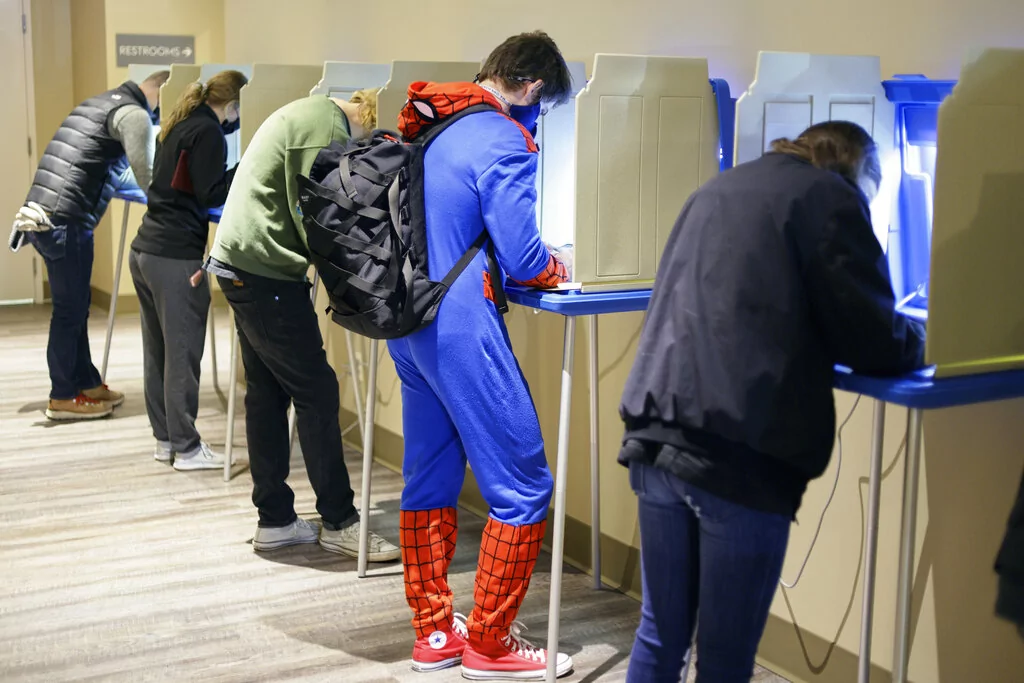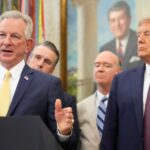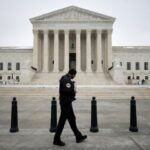
Nebraska, a primarily red state, is a special case in presidential elections. The Cornhusker State is one of two states that does not follow the winner-takes-all electoral system but rather divides up their five Electoral College votes. The winner of the popular vote gets two votes, and the other three go to the winners of the state’s three congressional districts.
The process was started in 1992 and has only been divided by party twice, with the second Congressional District (Omaha area) voting blue in 2008 and 2020. In the 2020 election, Donald Trump took the state by 19% and won four of their electoral votes.

Nebraska is also facing two competitive Senate races: a special election between incumbent Sen. Pete Ricketts (R-NE) and civil rights activist Preston Love Jr., and the election between incumbent Sen. Deb Fischer (R-NE) and independent Dan Osborn. Fischer has served as senator since 2012, and Ricketts, who was formerly the governor of Nebraska, was appointed to the senate seat when Sen. Ben Sasse resigned in 2023. The Nebraska Democratic Party chose to not run a candidate against Fischer after talks with Osborn, a Navy veteran and union leader.
The Washington Examiner is following the key issues people care about as they prepare to vote in the elections. The specific issues being tracked are Social Security, crime, abortion, the economy, and immigration.
2024 ELECTIONS LIVE UPDATES: LATEST NEWS ON THE TRUMP-HARRIS PRESIDENTIAL RACE
The issues were chosen with the help of the Associated Press issues tracker. The Washington Examiner subsequently compared five of the key issues in Google Trends on a state-by-state basis, revealing which issues are most important to voters in swing-state contests.
Here, you can track the importance of these various concerns to Nebraska voters over a rolling 30-day period.
Social Security
Social Security was the No. 1 issue for Nebraskans, and for good reason — Nebraska is one of the least-friendly tax states for retirees. The state does not exempt Social Security benefits from taxation despite nearly 55% of Nebraskans relying on Social Security for at least 50% of their income. About 28% rely on their benefits for 90% or more of their income.
Lawmakers have taken a stand against the issue, though. During his time as Nebraska’s governor, Ricketts signed LB873 in May 2022, which phases out state income taxes on Social Security benefits over 10 years. Following the success of that bill, Ricketts also proposed the Social Security Check Tax Cut Act in September 2023 which will phase out federal taxes on Social Security benefits.
“All Social Security benefits should be completely tax-free. My bill helps us get there in a fiscally responsible way,” Ricketts said. “During my time as Governor, we provided major relief to seniors by phasing out state taxes on Social Security benefits, and it’s time the federal government did the same. By passing this bill, we can take the first step in boosting the retirement income of millions of seniors in Nebraska and across the country.”
Crime
Crime was the second most important issue for Nebraska voters, and the state is one of the safest in the nation. The Cornhusker State’s violent crime rate is 26% lower than the national average at 283 incidents per 100,000 people.
Property crime is the primary safety concern for voters, with 47% of those surveyed by SafeWise saying they were highly concerned about property crime rates in the state. There were 1,889 property crimes per 100,000 residents in 2023, ranking the state 23rd in the nation and 4th in the Midwest for property crime.
Mass shootings went down from 2022 to 2023, also bringing down the amount of people who say gun violence is a concern to 38% in 2023. Gun violence remains an issue, though, as 10% of Nebraskans say they’ve encountered gun violence in the last year. However, experiences with violent crime have dropped 23% among residents from 2023 to 2024.
Abortion
Nebraskans rated abortion as the third most important issue, but the state is one of the few that has placed abortion protections on their ballot this November.
Currently, abortions are banned past 12 weeks with exceptions for rape, incest, and to save the life of the mother. Minors are required to obtain written consent from a parent or guardian, but pursuing judicial bypass is an option. There is also a mandatory pre-procedure 24-hour waiting period.
In November, two abortion initiatives will be on the ballot in Nebraska: the Right to Abortion Constitutional Amendment and the Protect Women and Children Constitutional Amendment. The former looks to enshrine abortion protections up to the point of viability, while the latter seeks to prohibit abortions after the first trimester (12 weeks) while keeping the current exceptions in place.
Fischer is devoted to the anti-abortion cause. After Roe v. Wade was overturned in 2022, she said in a statement, “The justices made the right decision in Dobbs v. Jackson Women’s Health Organization by affirming that there is no constitutional right to abortion.” The stance aligns with Ricketts’s view on the issue but is starkly different from the independent challenger, Osborn.
“I believe in a woman’s decision on whether or not to have an abortion is between her and her doctor. It’s not the federal government’s place to dictate those things to people,” Osborn said in an interview with Barn Raiser. “Deb Fischer believes in a complete abortion ban. I strongly disagree with that position.”
Nebraska is one of 11 other states that will have abortion measures on their ballots.
Economy
Economic concerns were fourth on the list for Nebraskans, and the state has a great unemployment track record, landing it sixth in the nation, according to the Bureau of Labor Statistics and Bureau of Economic Analysis. The unemployment rate in November 2023 was 2.3%, over a full point lower than the national average.
Nebraska’s gross domestic product has been steadily increasing since 2020, producing $179.2 billion in goods and services last year. The state’s economy grew 7.5%, placing it third in the nation for growth. However, Nebraska only contributes about 0.65% to the national economy.
Nebraska’s agriculture industry exploded last year with a 65% growth rate, the highest in the state, bringing in $12.15 billion in real GDP. Construction, manufacturing, and mining all saw growth as well, but education services decreased by 8.4%, the second-worst deficit in the state.
Immigration
Immigration was ranked last for trending issues in Nebraska. According to the American Immigration Council, the state’s population is 7.1% immigrants, and they make up roughly 8.5% of the workforce. The manufacturing industry has the highest level of immigrant workers in the state at 21.4%, but immigrants also make up sizable amounts of STEM, construction, and education workers.
CLICK HERE TO READ MORE FROM THE WASHINGTON EXAMINER
The most popular countries of origin for Nebraska immigrants are Mexico and Guatemala. About 29.4% of Nebraska’s immigrants are undocumented, but of the estimated 14,000 refugees in the state, 73.5% are naturalized and 98.2% are employed. In 2022, immigrants had a total spending power of $867 million and paid $228.8 million in taxes.
Nebraska doesn’t have a huge international student community, but in 2022, the 4,097 students contributed $112.1 million to the economy and 812 jobs were supported by them.






